- Home
- Fyodor Dostoyevsky
Poor Folk Anthology Page 27
Poor Folk Anthology Read online
Page 27
“And what possessed me to go for him in the middle of the night?” said our hero, trembling all over from a sickly sensation. “What the devil made me have anything to do with a drunken man! What could I expect from a drunken man? Whatever he says is a lie. But what was he hinting at, the ruffian? Lord, have mercy on us! And why did I write that letter? I’m my own enemy, I’m my own murderer! As if I couldn’t hold my tongue? I had to go scribbling nonsense! And what now! You are going to ruin, you are like an old rag, and yet you worry about your pride; you say, ‘my honour is wounded,’ you must stick up for your honour! My own murderer, that is what I am!”
Thus spoke Mr. Golyadkin and hardly dared to stir for terror. At last his eyes fastened upon an object which excited his interest to the utmost. In terror lest the object that caught his attention should prove to be an illusion, a deception of his fancy, he stretched out his hand to it with hope, with dread, with indescribable curiosity. No, it was not a deception Not a delusion! It was a letter, really a letter, undoubtedly a letter, and addressed to him. Mr. Golyadkin took the letter from the table. His heart beat terribly.
“No doubt that scoundrel brought it,” he thought, “put it there, and then forgot it; no doubt that is how it happened: no doubt that is just how it happened . ”
The letter was from Vahramyev, a young fellow-clerk who had once been his friend. “I had a presentiment of this,” thought our hero, “and I had a presentiment of all that there will be in the letter . ”
The letter was as follows —
“Dear Sir Yakov Petrovitch!
“Your servant is drunk, and there is no getting any sense out of him. For that reason I prefer to reply by letter. I hasten to inform you that the commission you’ve entrusted to me — that is, to deliver a letter to a certain person you know, I agree to carry out carefully and exactly. That person, who is very well known to you and who has taken the place of a friend to me, whose name I will refrain from mentioning (because I do not wish unnecessarily to blacken the reputation of a perfectly innocent man), lodges with us at Karolina Ivanovna’s, in the room in which, when you were among us, the infantry officer from Tambov used to be. That person, however, is always to be found in the company of honest and true-hearted persons, which is more than one can say for some people. I intend from this day to break off all connection with you; it’s impossible for us to remain on friendly terms and to keep up the appearance of comradeship congruous with them. And, therefore, I beg you, dear sir, immediately on the receipt of this candid letter from me, to send me the two roubles you owe me for the razor of foreign make which I sold you seven months ago, if you will kindly remember, when you were still living with us in the lodgings of Karolina Ivanovna, a lady whom I respect from the bottom of my heart. I am acting in this way because you, from the accounts I hear from sensible persons, have lost your dignity and reputation and have become a source of danger to the morals of the innocent and uncontaminated. For some persons are not straightforward, their words are full of falsity and their show of good intentions is suspicious. People can always be found capable of insulting Karolina Ivanovna, who is always irreproachable in her conduct, and an honest woman, and, what’s more, a maiden lady, though no longer young — though, on the other hand, of a good foreign family — and this fact I’ve been asked to mention in this letter by several persons, and I speak also for myself. In any case you will learn all in due time, if you haven’t learnt it yet, though you’ve made yourself notorious from one end of the town to the other, according to the accounts I hear from sensible people, and consequently might well have received intelligence relating to you, my dear sir, that a certain person you know, whose name I will not mention here, for certain honourable reasons, is highly respected by right-thinking people, and is, moreover, of lively and agreeable disposition, and is equally successful in the service and in the society of persons of common sense, is true in word and in friendship, and does not insult behind their back those with whom he is on friendly terms to their face.
“In any case, I remain
“Your obedient servant,
“N. Vahramyev.”
“P.S. You had better dismiss your man: he is a drunkard and probably gives you a great deal of trouble; you had better engage Yevstafy, who used to be in service here, and is not out of a place. Your present servant is not only a drunkard, but, what’s more, he’s a thief, for only last week he sold a pound of sugar to Karolina Ivanovna at less than cost price, which, in my opinion, he could not have done otherwise than by robing you in a very sly way, little by little, at different times. I write this to you for your own good, although some people can do nothing but insult and deceive everybody, especially persons of honesty and good nature; what is more, they slander them behind their back and misrepresent them, simply from envy, and because they can’t call themselves the same.
“V.”
After reading Vahramyev’s letter our hero remained for a long time sitting motionless on his sofa. A new light seemed breaking through the obscure and baffling fog which had surrounded him for the last two days. Our hero seemed to reach a partial understanding . He tried to get up from the sofa to take a turn about the room, to rouse himself, to collect his scattered ideas, to fix them upon a certain subject and then to set himself to rights a little, to think over his position thoroughly. But as soon as he tried to stand up he fell back again at once, weak and helpless. “Yes, of course, I had a presentiment of all that; how he writes though, and what is the real meaning of his words. Supposing I do understand the meaning; but what is it leading to? He should have said straight out: this and that is wanted, and I would have done it. Things have taken such a turn, things have come to such an unpleasant pass! Oh, if only tomorrow would make haste and come, and I could make haste and get to work! I know now what to do. I shall say this and that, I shall agree with his arguments, I won’t sell my honour, but . maybe; but he, that person we know of, that disagreeable person, how does he come to be mixed up in it? And why has he turned up here? Oh, if tomorrow would make haste and come! They’ll slander me before then, they are intriguing, they are working to spite me! The great thing is not to lose time, and now, for instance, to write a letter, and to say this and that and that I agree to this and that. And as soon as it is daylight tomorrow send it off, before he can do anything . and so checkmate them, get in before them, the darlings. They will ruin me by their slanders, and that’s the fact of the matter!”
Mr. Golyadkin drew the paper to him, took up a pen and wrote the following missive in answer to the secretary’s letter —
“Dear Sir Nestor Ignatyevitch!
“With amazement mingled with heartfelt distress I have perused your insulting letter to me, for I see clearly that you are referring to me when you speak of certain discreditable persons and false friends. I see with genuine sorrow how rapidly the calumny has spread and how deeply it has taken root, to the detriment of my prosperity, my honour and my good name. And this is the more distressing and mortifying that even honest people of a genuinely noble way of thinking and, what is even more important, of straightforward and open dispositions, abandon the interests of honourable men and with all the qualities of their hearts attach themselves to the pernicious corruption, which in our difficult and immoral age has unhappily increased and multiplied so greatly and so disloyally. In conclusion, I will say that the debt of two roubles of which you remind me I regard as a sacred duty to return to you in its entirety.
“As for your hints concerning a certain person of the female sex, concerning the intentions, calculations and various designs of that person, I can only tell you, sir, that I have but a very dim and obscure understanding of those insinuations. Permit me, sir, to preserve my honourable way of thinking and my good name undefiled, in any case. I am ready to stoop to a written explanation as more secure, and I am, moreover, ready to enter into conciliatory proposals on mutual terms, of course. To that end I beg you, my dear sir, to convey to that person my readiness for a personal arrange
ment and, what is more, to beg her to fix the time and place of the interview. It grieved me, sir, to read your hints of my having insulted you, having been treacherous to our original friendship and having spoken ill of you. I ascribe this misunderstanding to the abominable calumny, envy and ill-will of those whom I may justly stigmatize as my bitterest foes. But I suppose they do not know that innocence is strong through its very innocence, that the shamelessness, the insolence and the revolting familiarity of some persons, sooner or later gains the stigma of universal contempt; and that such persons come to ruin through nothing but their own worthlessness and the corruption of their own hearts. In conclusion, I beg you, sir, to convey to those persons that their strange pretensions and their dishonourable and fantastic desire to squeeze others out of the position which those others occupy, by their very existence in this world, and to take their place, are deserving of contempt, amazement, compassion and, what is more, the madhouse; moreover, such efforts are severely prohibited by law, which in my opinion is perfectly just, for every one ought to be satisfied with his own position. Every one has his fixed position, and if this is a joke it is a joke in very bad taste. I will say more: it is utterly immoral, for, I make bold to assure you, sir, my own views which I have expounded above, in regard to keeping one’s own place, are purely moral.
“In any case I have the honour to remain,
“Your humble servant,
“Y. Golyadkin.”
Chapter 10
Altogether, we may say, the adventures of the previous day had thoroughly unnerved Mr. Golyadkin. Our hero passed a very bad night; that is, he did not get thoroughly off to sleep for five minutes: as though some practical joker had scattered bristles in his bed. He spent the whole night in a sort of half-sleeping state, tossing from side to side, from right to left, moaning and groaning, dozing off for a moment, waking up again a minute later, and all was accompanied by a strange misery, vague memories, hideous visions — in fact, everything disagreeable that can be imagined .
At one moment the figure of Andrey Filippovitch appeared before him in a strange, mysterious half-light. It was a frigid, wrathful figure, with a cold, harsh eye and with stiffly polite word of blame on its lips . and as soon as Mr. Golyadkin began going up to Andrey Filippovitch to defend himself in some way and to prove to him that he was not at all such as his enemies represented him, that he was like this and like that, that he even possessed innate virtues of his own, superior to the average — at once a person only too well known for his discreditable behaviour appeared on the scene, and by some most revolting means instantly frustrated poor Mr. Golyadkin’s efforts, on the spot, almost before the latter’s eyes, blackened his reputation, trampled his dignity in the mud, and then immediately took possession of his place in the service and in society.
At another time Mr. Golyadkin’s head felt sore from some sort of slight blow of late conferred and humbly accepted, received either in the course of daily life or somehow in the performance of his duty, against which blow it was difficult to protest . And while Mr. Golyadkin was racking his brains over the question of why it was difficult to protest even against such a blow, this idea of a blow gradually melted away into a different form — into the form of some familiar, trifling, or rather important piece of nastiness which he had seen, heard, or even himself committed — and frequently committed, indeed, and not on nasty ground, not from any nasty impulse, even, but just because it happened — sometimes, for instance, out of delicacy, another time owing to his absolute defencelessness — in fact, because . because, in fact, Mr. Golyadkin knew perfectly well because of what! At this point Mr. Golyadkin blushed in his sleep, and, smothering his blushes, muttered to himself that in this case he ought to be able to show the strength of his character, he ought to be able to show in this case the remarkable strength of his character, and then wound up by asking himself, “What, after all, is strength of character? Why understand it now?” …
But what irritated and enraged Mr. Golyadkin most of all was that invariably, at such a moment, a person well known for his undignified burlesque turned up uninvited, and, regardless of the fact that the matter was apparently settled, he, too, would begin muttering, with an unseemly little smile “What’s the use of strength of character! How could you and I, Yakov Petrovitch, have strength of character? … ”
Then Mr. Golyadkin would dream that he was in the company of a number of persons distinguished for their wit and good breeding; that he, Mr. Golyadkin, too, was conspicuous for his wit and politeness, that everybody like him, which was very agreeable to Mr. Golyadkin, too, was conspicuous for his wit and politeness, that everybody liked him, even some of his enemies who were present began to like him, which was very agreeable to Mr. Golyadkin; that every one gave him precedence, and that at last Mr. Golyadkin himself, with gratification, overheard the host, drawing one of the guests aside, speak in his, Mr. Golyadkin’s praise . and all of a sudden, apropos of nothing, there appeared again a person, notorious for his treachery and brutal impulses, in the form of Mr. Golyadkin junior, and on the spot, at once, by his very appearance on the scene, Mr. Golyadkin junior destroyed the whole triumph and glory of Mr. Golyadkin senior, eclipsed Mr. Golyadkin senior, trampled him in the mud, and, at last, proved clearly that Golyadkin senior — that is, the genuine one — was not the genuine one at all but the sham, and that he, Golyadkin junior, was the real one; that, in fact, Mr. Golyadkin senior was not at all what he appeared to be, but something very disgraceful, and that consequently he had no right to mix in the society of honourable and well-bred people. And all this was done so quickly that Mr. Golyadkin had not time to open his mouth before all of them were subjugated, body and soul, by the wicked, sham Mr. Golyadkin, and with profound contempt rejected him, the real and innocent Mr. Golyadkin. There was not one person left whose opinion the infamous Mr. Golyadkin would not have changed round. There was not left one person, even the most insignificant of the company, to whom the false and worthless Mr. Golyadkin would not make up in his blandest manner, upon whom he would not fawn in his own way, before whom he would not burn sweet and agreeable incense, so that the flattered person simply sniffed and sneezed till the tears came, in token of the intensest pleasure. And the worst of it was that all this was done in a flash: the swiftness of movement of the false and worthless Mr. Golyadkin was marvellous! he sincerely had time, for instance, to make up to one person and win his good graces — and before one could wink an eye he was at another. He stealthily fawns on another, drops a smile of benevolence, twirls on his short, round, though rather wooden-looking leg, and already he’s at a third, and is cringing upon a third, he’s making up to him in a friendly way; before one has time to open one’s mouth, before one has time to feel surprised he’s at a fourth, at the same manoeuvres with him — it was horrible: sorcery and nothing else! And every one was pleased with him and everybody liked him, and every one was exalting him, and all were proclaiming in chorus that his politeness and sarcastic wit were infinitely superior to the politeness and sarcastic wit of the real Mr. Golyadkin and putting the real and innocent Mr. Golyadkin to shame thereby and rejecting the veritable Mr. Golyadkin, and shoving and pushing out the loyal Mr. Golyadkin, and showering blows on the man so well known for his love towards his fellow creatures! …
In misery, in terror and in fury, the cruelly treated Mr. Golyadkin ran out into the street and began trying to take a cab in order to drive straight to his Excellency’s, or, at any rate, to Andrey Filippovitch, but — horror! the cabman absolutely refused to take Mr. Golyadkin, saying, “We cannot drive two gentlemen exactly alike, sir; a good man tries to like honestly, your honour, and never has a double.” Overcome with shame, the unimpeachable, honest Mr. Golyadkin looked round and did, in fact, assure himself with his own eyes that the cabman and Petrushka, who had joined them, were all quite right, for the depraved Mr. Golyadkin was actually on the spot, beside him, close at hand, and with his characteristic nastiness was again, at this critical moment, certainly prepar
ing to do something very unseemly, and quite out of keeping with that gentlemanliness of character which is usually acquired by good breeding — that gentlemanliness of which the loathsome Mr. Golyadkin the second was always boasting on every opportunity. Beside himself with shame and despair, the utterly ruined though perfectly just Mr. Golyadkin dashed headlong away, wherever fate might lead him; but with every step he took, with every thud of his foot on the granite of the pavement, there leapt up as though out of the earth a Mr. Golyadkin precisely the same, perfectly alike, and of a revolting depravity of heart. And all these precisely similar Golyadkins set to running after one another as soon as they appeared, and stretched in a long chain like a file of geese, hobbling after the real Mr. Golyadkin, so there was nowhere to escape from these duplicates — so that Mr. Golyadkin, who was in every way deserving of compassion, was breathless with terror; so that at last a terrible multitude of duplicates had sprung into being; so that the whole town was obstructed at last by duplicate Golyadkins, and the police officer, seeing such a breach of decorum, was obliged to seize all these duplicates by the collar and to put them into the watch-house, which happened to be beside him . Numb and chill with horror, our hero woke up, and numb and chill with horror felt that his waking state was hardly more cheerful . It was oppressive and harrowing . He was overcome by such anguish that it seemed as though some one were gnawing at his heart.
At last Mr. Golyadkin could endure it no longer. “This shall not be!” he cried, resolutely sitting up in bed, and after this exclamation he felt fully awake.
It seemed as though it were rather late in the day. It was unusually light in the room. The sunshine filtered through the frozen panes and flooded the room with light, which surprised Mr. Golyadkin not a little and, so far as Mr. Golyadkin could remember, at least, there had scarcely ever been such exceptions in the course of the heavenly luminary before. Our hero had hardly time to wonder at this when he heard the clock buzzing behind the partition as thought it was just on the point of striking. “Now,” thought Mr. Golyadkin, and he prepared to listen with painful suspense .

 The Eternal Husband
The Eternal Husband Crime and Punishment
Crime and Punishment The Brothers Karamazov
The Brothers Karamazov Notes From Underground
Notes From Underground The Idiot
The Idiot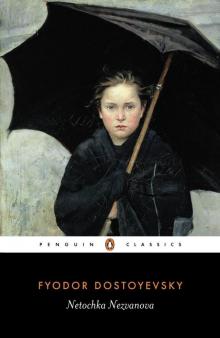 Netochka Nezvanova (Penguin ed.)
Netochka Nezvanova (Penguin ed.)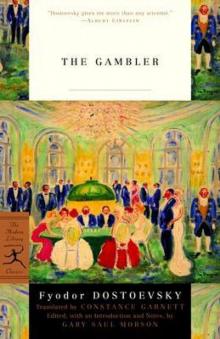 The Gambler
The Gambler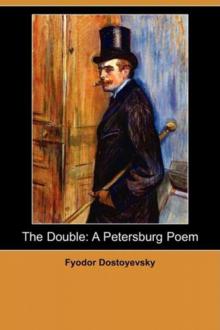 The Double
The Double Poor Folk Anthology
Poor Folk Anthology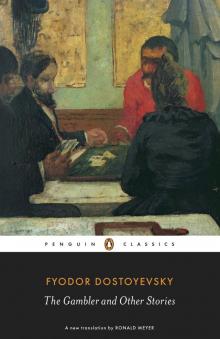 The Gambler and Other Stories (Penguin ed.)
The Gambler and Other Stories (Penguin ed.) Prestuplenie i nakazanie. English
Prestuplenie i nakazanie. English Notes from the Underground
Notes from the Underground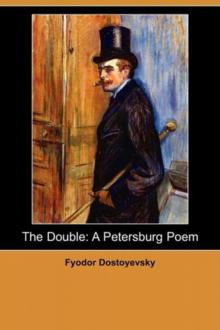 The Double: A Petersburg Poem
The Double: A Petersburg Poem White Nights and Other Stories / The Novels of Fyodor Dostoevsky, Volume X
White Nights and Other Stories / The Novels of Fyodor Dostoevsky, Volume X Complete Works of Fyodor Dostoyevsky
Complete Works of Fyodor Dostoyevsky Poor Folk and Other Stories
Poor Folk and Other Stories The House of the Dead
The House of the Dead